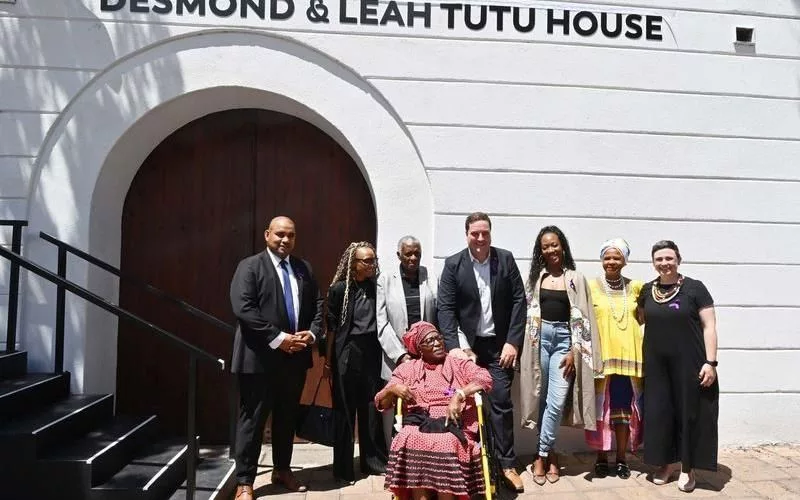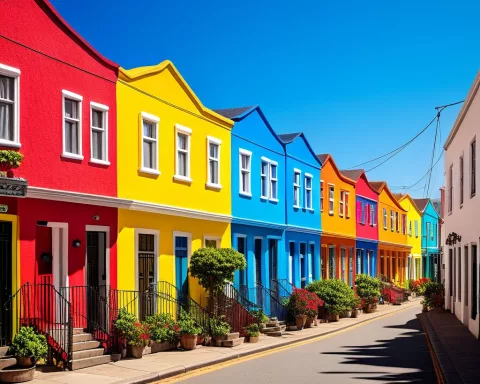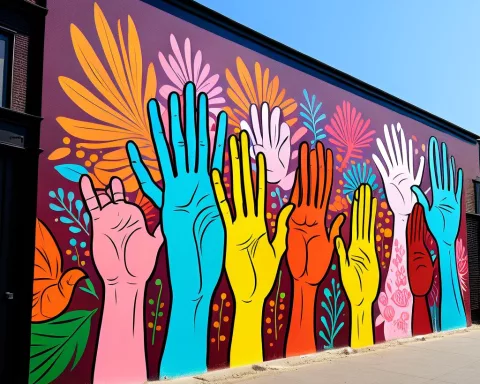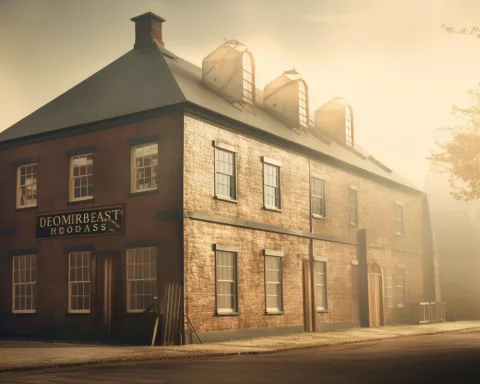The Desmond and Leah Tutu House in Cape Town is a historically significant building that has been renamed after two of South Africa’s most respected natives – Desmond Tutu and his wife, Leah Tutu. The building serves as a peace center, archive center, museum, and office space, symbolizing the healing process South Africa was undergoing and standing as a tribute to the Tutu’s legacy of promoting compassion, resilience, and unity. The renaming signifies a recommitment to social justice, and the Tutus’ hopeful spirit serves as a timely nudge to continue striving towards building a free, fair, inclusive, and prosperous nation.
What is the Desmond and Leah Tutu House in Cape Town?
The Desmond and Leah Tutu House is a historically significant building located in Zonnebloem at 11 Buitenkant Street, Cape Town. Formerly known as the Old Granary, it has been renamed after two of South Africa’s most respected natives – Desmond Tutu and his wife, Leah Tutu. The building serves as a peace center, archive center, museum, and office space, symbolizing the healing process South Africa was undergoing and standing as a tribute to the Tutu’s legacy of promoting compassion, resilience, and unity.
On a remarkable day filled with an aura of remembrance, honor and expectation, Cape Town revealed the new identity of a historically significant building on Tuesday, 20 February 2024. Reviving memories from South Africa’s rich past, the building, once addressed as the Old Granary, has been renamed after two of the country’s most respected natives – Desmond Tutu and his wife, Leah Tutu. The momentous event was designed with utmost respect and to pay tribute to the late Archbishop and his wife, who were stalwarts in the realms of peace, justice, and transformation in South Africa.
A Rich Tapestry of History and Transformation
Located in the heart of Zonnebloem at 11 Buitenkant Street, the Old Granary building’s history is as rich and intricate as the city itself. Erected between 1808 and 1813, the building has played diverse roles over its 200-year existence. Each phase of its life, whether as a bakery, granary, women’s jail, customs house, court, police office or Public Works offices, added a new layer to its enduring story.
In the year 2015, a significant milestone was achieved when the Desmond and Leah Tutu Legacy Foundation collaborated with the city to refurbish the Old Granary building. This strategic move revitalized the old structure and turned it into a peace center, archive center, museum, and office space. The refurbishment symbolized the healing process South Africa was undergoing and stood as a tribute to the Tutu’s legacy of promoting compassion, resilience, and unity.
A Beacon of Hope and Resilience
The Desmond and Leah Tutu Legacy Foundation has been a shining light of hope since its inception in 2011. It has been continually challenging injustices and promoting unity and understanding. Mayor Geordin Hill-Lewis drew attention to this during the renaming event and praised the building’s metaphorical representation of transformation and healing. Referencing the late Archbishop’s words, he emphasized that the building, which holds a history of separation and strife, now stands as a symbol of the compassion and dignity required to achieve everyday peace.
As South Africa contends with modern-day challenges, the Tutus’ hopeful spirit serves as a timely nudge to continue striving towards building a free, fair, inclusive, and prosperous nation. The renaming of the Old Granary to the Desmond and Leah Tutu House signifies more than just a change in nomenclature. It represents a recommitment to social justice, rightfully coinciding with the World Day of Social Justice.
A Tribute to the Tutus’ Legacy
During the renaming ceremony, Deputy Mayor and Chairperson of the Naming Committee, Alderman Eddie Andrews, acknowledged the global theme for 2024, ‘Global Coalition for Social Justice: Bridging Gaps, Building Alliances.’ He expressed his appreciation for the timing of the Tutus’ honor, recognizing their significant efforts in fostering social justice. Andrews expressed gratitude to the public for their involvement and support in renaming the building in honor of two extraordinary South Africans whose impact has transcended borders.
The decision to rename the building was put forth by the Economic Growth Directorate, the managers of the Old Granary. The City’s Mayoral Committee Member for Economic Growth, Alderman James Vos, expressed a desire to preserve and continue the Tutus’ legacy. Their contributions to Cape Town’s political and socio-cultural fabric and South Africa at large are internationally recognized, their unyielding spirit considered a symbol of virtue and steadfastness.
To conclude, the Desmond and Leah Tutu House is a physical embodiment of the Tutus’ lasting legacy. It serves as a testament to the human spirit’s resilience, the quest for justice, and the transformative power of compassion and unity. As people pass by this newly christened building, they will be reminded of the bridge that’s being built to close gaps and build alliances. This historical edifice, brimming with history and symbolizing the nation’s journey, now bears the name of two of Cape Town’s most beloved citizens, engraving their legacy in the city’s heart.
1. What is the Desmond and Leah Tutu House in Cape Town?
The Desmond and Leah Tutu House is a historically significant building located in Zonnebloem at 11 Buitenkant Street, Cape Town. Formerly known as the Old Granary, it has been renamed after two of South Africa’s most respected natives – Desmond Tutu and his wife, Leah Tutu. The building serves as a peace center, archive center, museum, and office space, symbolizing the healing process South Africa was undergoing and standing as a tribute to the Tutu’s legacy of promoting compassion, resilience, and unity.
2. What is the history of the Old Granary building in Cape Town?
The Old Granary building, located in Zonnebloem at 11 Buitenkant Street, Cape Town, was erected between 1808 and 1813 and has played diverse roles over its 200-year existence, including a bakery, granary, women’s jail, customs house, court, police office, and Public Works offices.
3. What is the significance of the renaming of the Old Granary building to the Desmond and Leah Tutu House?
The renaming of the Old Granary building to the Desmond and Leah Tutu House signifies more than just a change in nomenclature. It represents a recommitment to social justice, rightfully coinciding with the World Day of Social Justice, and symbolizes the Tutus’ legacy of promoting compassion, resilience, and unity.
4. What is the role of the Desmond and Leah Tutu Legacy Foundation?
The Desmond and Leah Tutu Legacy Foundation has been continually challenging injustices and promoting unity and understanding since its inception in 2011. It was instrumental in the refurbishment of the Old Granary building, turning it into a peace center, archive center, museum, and office space, symbolizing the healing process South Africa was undergoing and standing as a tribute to the Tutus’ legacy.
5. Who initiated the renaming of the Old Granary building to the Desmond and Leah Tutu House?
The decision to rename the building was put forth by the Economic Growth Directorate, the managers of the Old Granary. The City’s Mayoral Committee Member for Economic Growth, Alderman James Vos, expressed a desire to preserve and continue the Tutus’ legacy.
6. What is the Tutus’ legacy?
The Tutus’ legacy is one of promoting compassion, resilience, and unity. Their contributions to Cape Town’s political and socio-cultural fabric and South Africa at large are internationally recognized, their unyielding spirit considered a symbol of virtue and steadfastness. The renaming of the Old Granary building to the Desmond and Leah Tutu House serves as a tribute to their legacy.












